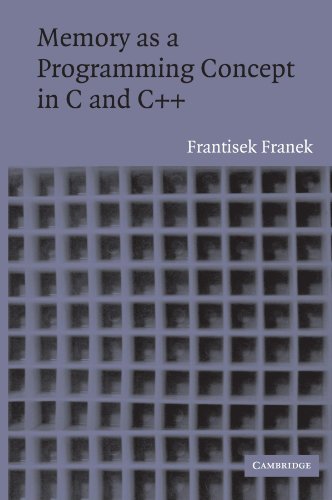Memory as a Programming Concept in C and C++ download
Par dailey mark le mardi, septembre 27 2016, 00:26 - Lien permanent
Memory as a Programming Concept in C and C++ by Frantisek Franek


Download eBook
Memory as a Programming Concept in C and C++ Frantisek Franek ebook
Publisher: Cambridge University Press
Format: chm
ISBN: 0521520436, 9780521520430
Page: 272
C vs C++ : Embedded system, performance, size, object oriented programming, modular programming. There was quite a bit in the text that I'd agree with, including the reason he gives for C++ programmers not liking Go (although IMHO he misses the other half of the reason, which is that Go doesn't improve over C enough to really make it worthwhile for many). Sun May 05, 10:31:00 PM PDT · Post a Comment · Older Post Home. Memory Management - posted in General Programming: I am setting up a simple memory management in my program and I would like some feedback. Since this results in a 4-byte pointer pointing to 1 byte of allocated memory, writing to this pointer will either cause a run-time error or will overwrite some adjacent memory. Now it has to be said that "with great power comes great responsibility" and if you use Unsafe it is effectively the same as programming in C, and with that can come memory access violations when you get offsets wrong. However, one of the things written there is actually true – we do have plans to create an IntelliJ-based C++ IDE at some point. Achingly, heartbreakingly clear, because some hardware incents you to pull out the big guns to achieve top performance, and C++ programmers just are so addicted to full performance that they'll reach for the big red levers with the flashing The facts: The C++11 memory model and what it requires you to do to make sure your code is correct and stays correct. Static analysis is a powerful technique for quickly finding programming defects in the earliest stages of development and is especially useful for statically typed languages like C and C++. In contrast to the C-style cast, the static cast will allow the compiler to check that the pointer and pointee data types are compatible, which allows the programmer to catch this incorrect pointer assignment during compilation. *p = 5; // run-time error: stack corruption. Embedded systems are often severely constrained in memory while still requiring high performance. Warning 423: Creation of memory leak in assignment to 'p' long *p; p = malloc(4); Warning 433: Allocated area not large enough for pointer char c; while ((c = getc(fp)) ! I would love to see some presentation or article /blog post/write up on shared memory programming in C++(boost, poco or whatever else). In this post I will discuss FlexeLint, a mature static analysis tool for C and C++ from Gimpel Software. But the part Well, not the nested callbacks part because Iced makes that better, but because of the parallel goodness of goroutines, better memory management and actually compiling to decent native code. I'd loved to have had this available ten years ago when I was first blundering through these concepts.